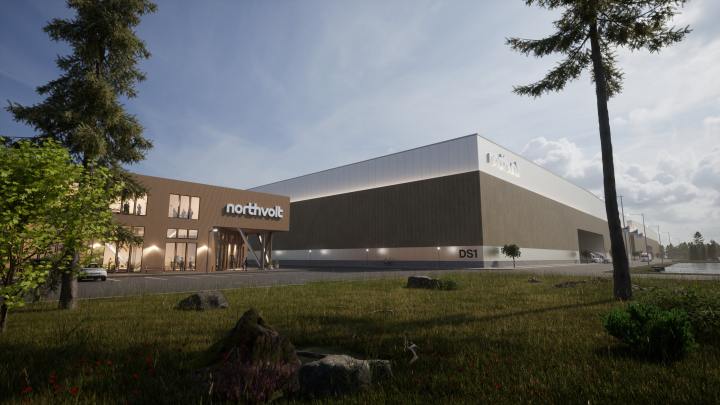
As the U.S. courts EV battery manufacturers, Canada follows suit
As the U.S. courts EV battery manufacturers, Canada follows suit

Starting Jan. 1, some electric vehicles will get more expensive. They’ll be losing eligibility for tax breaks because they don’t have enough components sourced from or assembled in North America.
Behind these tax credit changes is an effort by the federal government to pull the supply chains for EVs – especially their batteries – away from China and onto this continent.
If those requirements aren’t enough to encourage battery manufacturers to build plants in the U.S., they’re also eligible for financial incentives through the Inflation Reduction Act.
But the tax credit requirements include all of North America, not just the U.S. So battery makers are setting up shop in Canada, too, and the government there is offering subsidies of its own.
This is especially true in the predominantly French-speaking province of Quebec, where on a recent afternoon, Laurent Therrien and I trudged along an abandoned road covered in wet snow.
“So, we are just next to the Richelieu River,” Therrien said. “It’s a peaceful suburb.”

We were about a dozen miles from Montreal, on land that used to be home to a manufacturing plant that closed in the 1990s after 120 years. It made things like “dynamite, chemicals, air bags,” Therrien explained.
The chemical and explosives plant is long gone. Now, trees and reeds have grown up from the remediated soil. But if Therrien’s company completes its plans, in a few years, they’ll be replaced by a battery manufacturing plant.
“It’s a complex of pretty massive buildings,” he said, “because battery manufacturing takes a lot of space.”
Therrien is a communications director with Northvolt, a Swedish firm that makes batteries for car companies including Volkswagen, Volvo and BMW. Northvolt has grown quickly in Europe, and even before the Inflation Reduction Act, or IRA, passed in the U.S., it was eyeing an expansion to North America.
“At first, we didn’t very much look into Canada,” Therrien said. “We were looking at building the plant in the U.S.”
But then, Therrien said, Northvolt got a call from a Canadian economic minister.
“What Canada says is, ‘we don’t have the big pockets the Americans do, but on some specific projects we can choose to mimic IRA or mirror IRA,’” he said. And the cars Northvolt’s batteries end up in would still be eligible for that U.S. tax credit.
Northvolt ended up with a funding package from the Quebec and Canadian governments worth over $2 billion. And it could receive billions more once the plant starts producing batteries.
But it wasn’t just subsidies that swung Northvolt’s decision in Quebec’s favor. There were two other big factors, starting with the giant, province-owned power utility, Hydro-Québec.
“You have to sort of see Hydro-Québec as the… Saudi Aramco of Quebec,” explained François Bouffard, an associate professor of electrical engineering at McGill University in Montreal. Hydro-Québec was created in the 1940s, and built massive dams on the province’s northern rivers.

“The advantage of all these decisions that were made in the 1960s, 70s and 80s, is that now we have, yes, a quasi-100% green power in Quebec, and we’ve also enjoyed some of the lowest rates,” Bouffard said.
Hydro-Québec’s dams are not without controversy; their creation flooded indigenous land. But they gave the province abundant, renewable energy, a major selling point for Northvolt, and something provincial economic boosters tout to industry.
“We’re blessed by our geography,” said Jean-François Béland, a vice president of Invest Quebec, the government-owned investment bank. In addition to cheap hydropower, the province also has mineral deposits that are critical for battery makers.
“We have the lithium, we have the nickel, the copper, essentially the basis, the input of the process,” Beland said.
Batteries created with renewable energy and nearby minerals are a big plus for Northvolt, but some critics are worried about the potential environmental impact of the company’s plant, while others don’t like that billions are going to foreign companies.
“It’s really hard to prove that these subsidies do have the effect they want to have,” said Jean-Philippe Meloche, a professor at the Université de Montreal. He’s studied past subsidy programs in Quebec, and said he thinks the government would’ve done better to fund local research and development.
“What we know is that where we get the better value in economic development is where we have the knowledge and innovation within our industry,” Meloche said.
But local supporters contend that the 3,000 or so jobs expected to be created by the Northvolt plant will boost the local economy for a decade or more.

Trudging back across the company’s future site outside Montreal, Northvolt’s Laurent Therrien is thinking in a shorter time frame.
“This is a global run to market,” he said. “And we want to deliver our first cells out of our first building in July of ‘26.”
In the battery world, he said, that’s basically tomorrow. So the company will take all the government support it can get.
There’s a lot happening in the world. Through it all, Marketplace is here for you.
You rely on Marketplace to break down the world’s events and tell you how it affects you in a fact-based, approachable way. We rely on your financial support to keep making that possible.
Your donation today powers the independent journalism that you rely on. For just $5/month, you can help sustain Marketplace so we can keep reporting on the things that matter to you.

















